When Warsaw mayor Rafał Trzaskowski declared in 2019 that the city is LGBTQ+ friendly,he probably didn’t think it would launch a campaign of discrimination across Poland.
With a large percentage of the population identifying as Catholic,and a history of largely right-wing governments,it seemed an unlikely place for its capital to be declared as LGBTQ+ friendly.
A wave of homophobia then swept across the country and by 2020,more than 100 anti-LGBT resolutions popped up in the south and east of Poland.
Activists started protesting,branding the areas as ‘LGBTQ+ free zones.’
Last month,in the town of Łańcut,officials announced they had finally abolished the last of the LGBTQ+ free zones after more than five years – signalling hope for the future.
But with another right-wing president elected and an MP kicked out of parliament recently for trashing an LGBTQ+ exhibition,the community is fearful of what’s still to come.
Olga Pawłowska-Plesińska described her creeping dread when the LGBTQ+ free zones started being enacted.
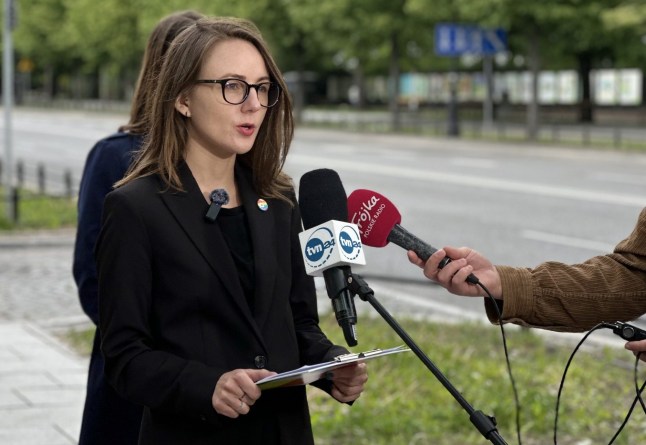
Olga was horrified as the discriminatory bills started passing around Poland (Picture: Olga Pawłowska-Plesińska)
‘At first,we thought that it was a harmless act by a small group of fanatics that would end quickly,’ she told Metro.
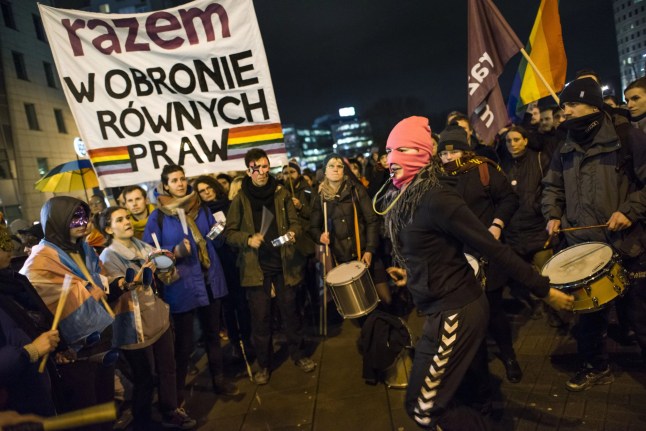 There were widespread protests against the LGBT free zones (Picture: AP)Data gathered by KPH found LGBT+ people living in the zones experienced more suicidal thoughts,increasing by 16%.Ko Natoński is from one of the regions which introduced an anti-LGBT resolution.The 24-year-old moved away from Łańcucki Powiat to study in Warsaw in 2019,a couple of months after the LGBT free zone was established,but said it didn’t play a part in their decision to leave.They told Metro: ‘Many of my friends and I moved to Warsaw with no intention of going back.
There were widespread protests against the LGBT free zones (Picture: AP)Data gathered by KPH found LGBT+ people living in the zones experienced more suicidal thoughts,increasing by 16%.Ko Natoński is from one of the regions which introduced an anti-LGBT resolution.The 24-year-old moved away from Łańcucki Powiat to study in Warsaw in 2019,a couple of months after the LGBT free zone was established,but said it didn’t play a part in their decision to leave.They told Metro: ‘Many of my friends and I moved to Warsaw with no intention of going back.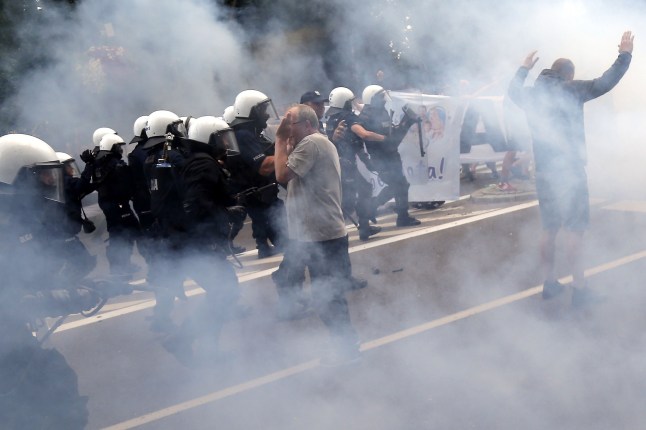 Riot police fire tear gas to disperse ultra-nationalists who attempted to block the first gay pride march in Bialystok in 2019 (Picture: Jerzy Baliski/AFP)‘I didn’t know a single openly LGBT+ person before coming to Warsaw,even after having attended high school in fairly large Rzeszów.’After the final discriminatory bill was repealed,Ko said: ‘The sliver of joy after the last LGBT free zone was gone was quickly overshadowed by the right-wing extremist surge in the elections.’Along with Ko,Zuza Głowacka and Adam Musielak both work at Warsaw House,a charity which supports LGBTQ+ homeless youths.Zuza told Metro: ‘When there is hatred in the top government it trickles down to communities,to families,to schools,and then young people are rejected by their families and often times thrown out of their homes.
Riot police fire tear gas to disperse ultra-nationalists who attempted to block the first gay pride march in Bialystok in 2019 (Picture: Jerzy Baliski/AFP)‘I didn’t know a single openly LGBT+ person before coming to Warsaw,even after having attended high school in fairly large Rzeszów.’After the final discriminatory bill was repealed,Ko said: ‘The sliver of joy after the last LGBT free zone was gone was quickly overshadowed by the right-wing extremist surge in the elections.’Along with Ko,Zuza Głowacka and Adam Musielak both work at Warsaw House,a charity which supports LGBTQ+ homeless youths.Zuza told Metro: ‘When there is hatred in the top government it trickles down to communities,to families,to schools,and then young people are rejected by their families and often times thrown out of their homes.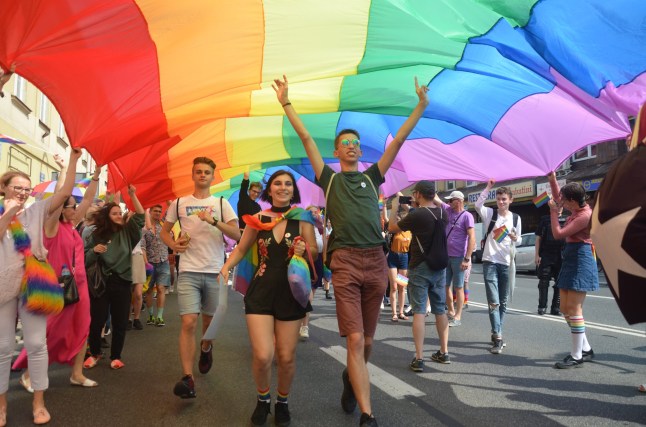 Warsaw has hosted several Pride parades in recent years (Picture: Wiki Commons)‘In Poland,the cities are much more queer friendly,but they’re also much more expensive. You want to go to a place where you are accepted and there’s a community,but you can’t afford to live there.‘We have people running away from their families and the conservative parts of Poland to come to Warsaw and be safe,and also be themselves. ‘I think especially for young people their first instinct is “I need to be where I’m safe and have a community and be able to be myself”.’
Warsaw has hosted several Pride parades in recent years (Picture: Wiki Commons)‘In Poland,the cities are much more queer friendly,but they’re also much more expensive. You want to go to a place where you are accepted and there’s a community,but you can’t afford to live there.‘We have people running away from their families and the conservative parts of Poland to come to Warsaw and be safe,and also be themselves. ‘I think especially for young people their first instinct is “I need to be where I’m safe and have a community and be able to be myself”.’The Atlas of Hate - how one map brought down LGBT free zones across Poland
The Atlas of Hate (Atlas Nienawiści) website is an interactive map which serves as a record of how much of Poland – about a third of the country – tried to reject its LGBTQ+ residents.
It documented authorities considering or enacting resolutions opposing ‘LGBTQ+ ideology’ or creating charters of family rights.
Far right group Ordo Iuris even created a ready-to-pass Charter of Family Rights (SKPR),which was used by several authorities.
The bills have all since been rejected. They were either never enacted in the first place or have been repealed following pushback.
The EU withdrew funding to some of these regions due to their discriminatory nature – meaning some lost millions of Euros or scrapped the bills to keep the cash.
But seven local authorities sued the four activists behind the Atlas of Hate.
They said the map defamed them and demanded the four founders pay 20,000 złoty (£3,900) and publicly apologise to each of them.
Thankfully,almost all of the lawsuits have ended in victory for the four Atlas of Hate creators.
Two of the authorities withdrew their claims while the other five were dismissed by regional courts. Two appeals against those dismissals are awaiting decision.
Jakub Gawron is from Rzeszów in the south eastern part of Poland. He’s one of the founders of Atlas of Hate and has been co-organising equality marches in the city for several years.
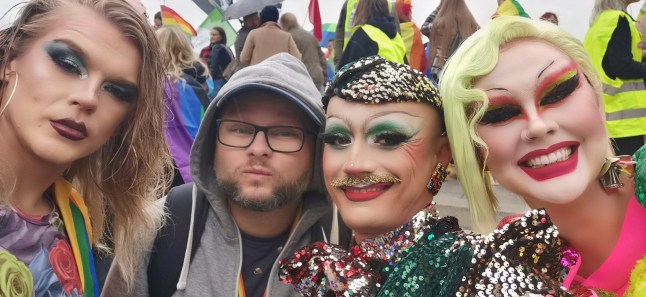
(L-R) Gąsiu,Jakub Gawron,Twoja Stara and Lola Eyeonyou Potocki celebrating Pride (Picture: Jakub Gawron)
He said he and the other creators were ‘overwhelmed’ when the Atlas became ‘capable of influencing local government officials,politicians,and EU institutions’.
Speaking to Metro about his next steps,Jakub said: ‘I will continue to help organize the equality march in Rzeszow. I also want to summarize the history of Atlas Nienawiści in a book.
‘Unfortunately,after the election of Nawrocki as president,the prospect of a coalition government of far-right parties in the next two years has become real.
‘We expect that in a few years this government will be putting forward proposals to ban transition and equality marches,like in Hungary and Russia.’
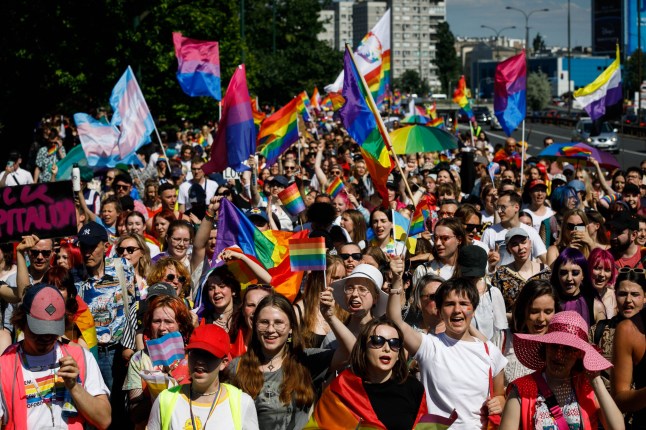
Warsaw Equality Parade in 2022 (Picture: Volha Shukaila/SOPA Images/LightRocket via Getty Images)
Now the LGBT free zones are gone,activists are turning their attention to the next milestones to improve life for the queer people living in Poland.
When asked what he thinks the community will turn to next,Adam said: ‘I think everybody’s waiting for legal same-sex relationships. Marriage is something that we dream of,but even unions between same-sex couples is something everybody is waiting for.’
Despite being one of the first European nations to decriminalise homosexuality in 1932,gay marriage is still illegal.
‘Even in some polls,the Polish people agree with this,’ Adam said. ‘So I think that’s the main thing everybody is waiting for.
‘We just changed the law for transgender people,because previously they had to sue their parents to change their sex on documents,now that’s finally changed so this is great for them.
‘Those are the two main things,same-sex unions and hate crimes against the LGBTQ community,because it’s still not considered a hate crime.’
Metro spoke to Hubert Sobecki,a board member of the Polish campaign for marriage equality campaign Love Does Not Exclude (Miłość Nie Wyklucza).
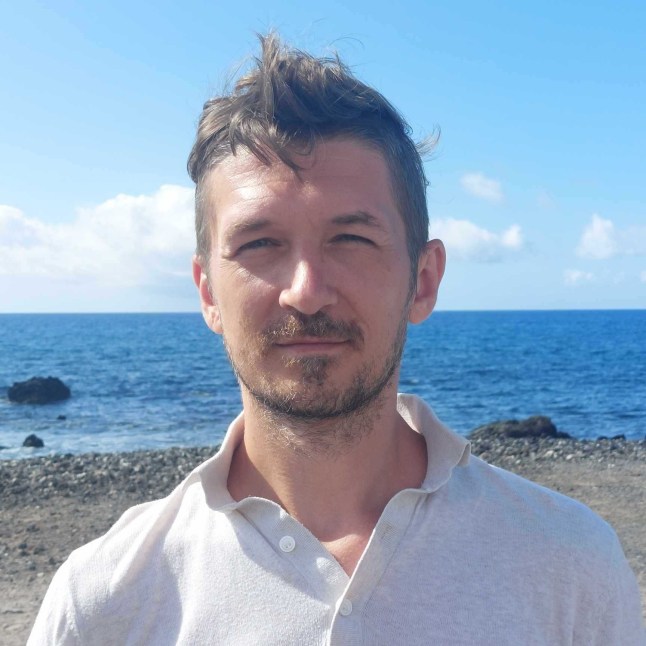
Hubert Sobecki from Love Does Not Exclude (Picture: Hubert Sobecki)
He said the presidential elections earlier this month,which saw Polish nationalist and conservative Karol Nawrocki take the top job,have caused pessimism within the community.
Discussing Nawrocki’s views about the LGBTQ+ community,Hubert,from Warsaw,said: ‘The way he sees us is subhuman,let’s be frank.
‘He did not openly use hate speech. He did not repeat the slogan about LGBT+ being an ideology rather than people. But his campaign tried to stir moral panic around trans issues.
‘The main problem is that we have no rights,so it’s very difficult to say that the woke madness has gone too far because it never started.
‘It’s very clear to us that he is a product of his own political background. When it comes to his past,and the kind of person he seems to be,it’s terrifying.
‘He’s a scary guy. He is definitely a risk for the country,not just for the community.’
And what of the Love Does Not Exclude campaign for same-sex marriage?
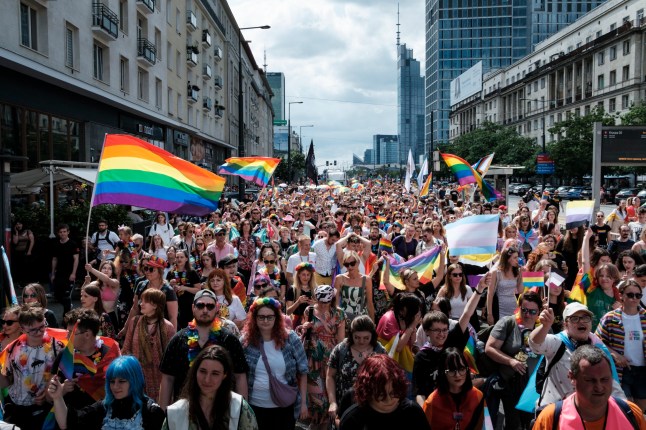
Warsaw Equality Parade in 2024 (Picture: Piotr Lapinski/NurPhoto via Getty Images)
‘We will still be campaigning about marriage equality,it’s our mission,and we have public support,around 50% at this point,which means it’s working,’ Hubert explained.
‘Earlier this month we were talking with the minister for equality from this government about the draft of the civil unions bill passing parliament,and now should it even pass,it won’t be signed.
‘We put quite a lot of effort into making this draft happen,and we pressured politicians to support it once it gets read,discussed and voted on,and now it doesn’t matter.
‘The good thing is that we did survive the previous government and the previous president,so we know how to approach this.’
Looking to the future of LGBTQ+ activism in Poland is daunting,Hubert said,but all the while he is trying to ‘count his blessings’.
He said: ‘This is not Russia,and this is not Hungary. We might become Hungary within the next two years,but we’re not there yet and that’s a blessing.
‘Nobody’s talking about making us illegal,nobody’s talking about calling us foreign agents,and nobody’s talking about attacking us physically using the Secret Service,something that did happen in Budapest.
‘All those things might come,but they’re not here yet.
‘I think we [Polish people] have contrarianism in our blood,and I think self-organisation and protests show that we are able as a society to come together and make this sort of effort.’
United News - unews.co.za